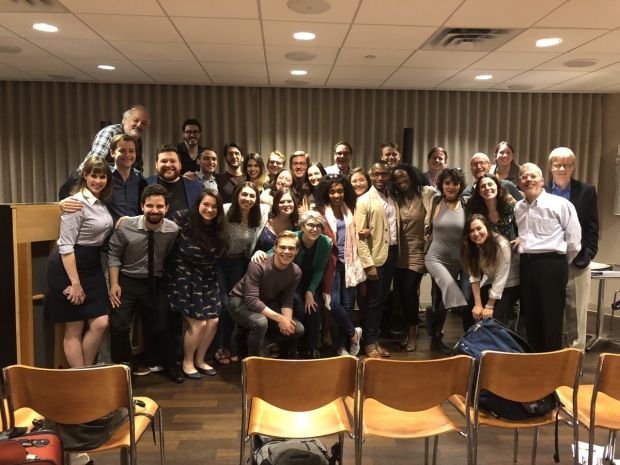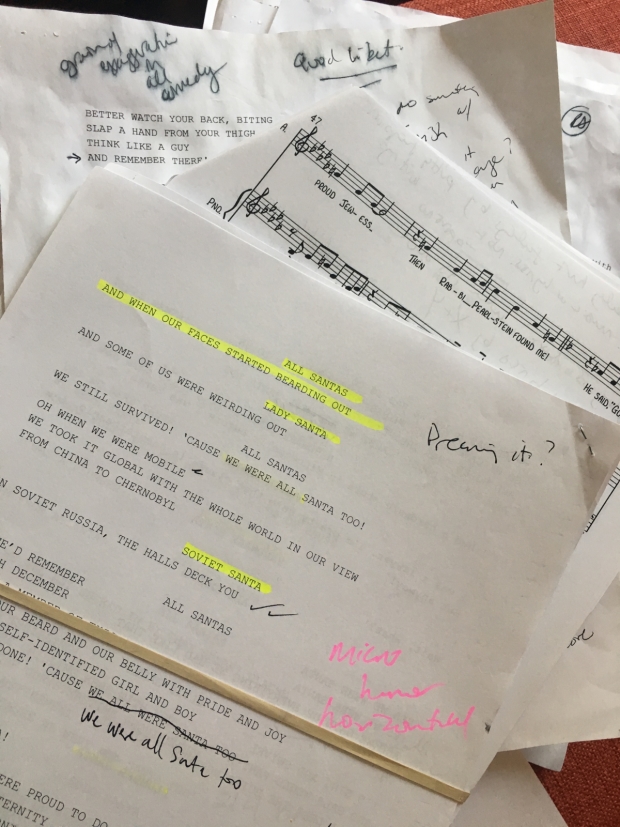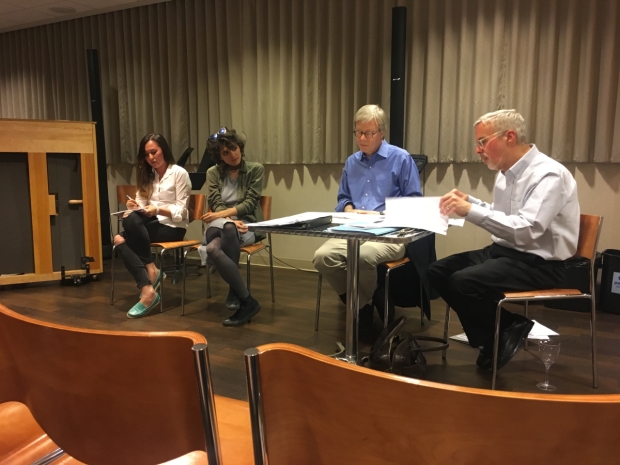How Musical Theater Magic Is Made, One Class at a Time
Rachel Sklar on learning the craft at BMI with the best in the business.

(© Daniel Mertzlufft)
It is a strange and magical thing to get a second chance at your lifelong dream. I have always been a lover of musicals; an amateur performer, director, and, because at summer camp you have to be everything, choreographer; and, most germanely to this piece, a lyricist and songwriter. Like many theater kids, I harbored dreams of a life on Broadway, and even as I moved to New York to become a lawyer, I knew it was a step closer to my goal, and almost literally, because my office was right next to the Belasco Theatre. Over the years, I took a few more steps, quit law to write full-time, singing my goofy songs in comedy shows around town, and, briefly, waitressing at Marie's Crisis. I considered myself firmly "musical-theater adjacent," and over time, that was enough.
But then — bang! flash! and a lightning crash! — I learned about the BMI Lehman Engel Musical Theatre Workshop. I'd gone 15 years in New York blaring my showtune obsession to anyone within earshot, but suddenly now I was hearing about it, including from a young man on a plane from Toronto to New York who saw me scribbling lyrics and revealed that he commuted every week. Hard core! Sign me up.
I auditioned, then re-auditioned. Then re-auditioned. I was a 44-year-old single mom of a toddler. I'm hard-core, too. I got in.
I walked into my first BMI classroom with 40-something or so other newbie musical-theater composers and lyricists, and a tall, sandy-haired man with glasses and an air of authority stood and called the class to order. He was, and still is, BMI Director of Musical Theatre and Jazz, Patrick Cook, or "Pat" to his friends and students. Pat has run the BMI Musical Theatre Workshop for 17 years at Broadcast Music, Inc., the leading performing rights organization founded in 1939 with the mission to help all songwriters and composers actually get paid for their work.
Pat introduced himself and his co-moderator, Fredrick "Rick" Freyer, a kindly-faced man who nonetheless would tell you if your arpeggios were basic. They explained the genesis of the workshop, founded in 1961 by Tony-winning composer and veteran Broadway conductor Lehman Engel, who had been concerned about the craft of young musical-theater writers and so, with the support of BMI, established an advanced workshop for the next generation of creators. The Workshop had gone on to incubate giants like Alan Menken (Little Shop of Horrors), Carol Hall (Best Little Whorehouse in Texas), Ed Kleban (A Chorus Line), Jeanine Tesori (Fun Home), Lynn Ahrens and Stephen Flaherty (Ragtime), and Robert Lopez (Book of Mormon) and Kristen Anderson-Lopez (Frozen). The bar was high.
We sat there, a motley group that included earnest graduates of musical-theater programs, veteran composers, people workshopping full-length musicals, a Hamilton rehearsal pianist, and a member of the U.S. Army Band. Two people were commuting from other cities; three had picked up and moved across the country. We were all there because we loved musical theater and thought we could maybe, someday, actually create it. Pat and Rick were there to help us do it right. "Talent without craft is meaningless," intoned Pat, before inveighing lengthily against misaccents. (He really hates misaccents.)
The class was a fascinating blend of history (short version: get to know the 32-bar chorus) and fundamentals ("It's the job of the music to tell the truth") peppered with advice that I assumed I'd get eventually ("resist the short chorus, and also the long chorus") and helpful reassurances that also hinted at doom ("Let us get to you before Ben Brantley does!"). In first year we'd learn the basics of song and scene writing, story, and character, before spending the whole of year two workshopping a full-length musical. There was also a librettist workshop that we'd get to work with later in the year. It sounded exciting and fun. I'm not sure any of us realized how much work it would be.
We had eight assignments over the year and were paired with a different composer-lyricist counterpart for each of them. We collaborated in a fever-dream of implacable deadlines, with our work performed by members of the class, who turned out to include some massive ringers. I loved the lectures, but the work was where you really got to know your classmates, stand in total awe of them, and develop instant imposter syndrome. We were all earnestly grappling with our limitations, but between smart feedback from our classmates and Pat and Rick's mostly kind but mostly uncompromising critiques — "More melodic anchors were needed," "This song is about too many things" — the lessons were starting to take. Through our wobbly Streetcar Named Desire assignment ("You have to have a Blanche song in your trunk!") to our jolly Christmas charm songs, our class was starting to jell.

(© Rachel Sklar)
This is exactly what Pat and Rick wanted — they knew that great collaborations were forged at BMI, because they are living proof. Young Pat and Young Rick joined the workshop as students in the 1983 class. They went on to work as collaborators, including on the score for Captains Courageous, and subsequently, the BMI Musical Theatre Workshop.
This is what's known as "living the brand," and sitting in his show-poster-bedecked office on the 31st floor in Lower Manhattan, Pat truly does. Photos of BMI colleagues adorn his walls. When Pat tells me about the history of his BMI experience, it's clear he loves his colleagues and, dare I say, his students. "First year is always my favorite," he says, "because people are finding their own voices, they are experimenting. Most of them haven't been in an environment like BMI. It's wonderful to see people coming out, getting feedback, just finding their voices."
Pat regales me with tales of the great work that has come out of BMI. Robert Lopez and Kristen Anderson-Lopez, collaborators and spouses, met at BMI. Ed Kleban performed in a BMI showcase when he was espied by Michael Bennett, who invited him to discuss a fledgling project he was working on (yes, A Chorus Line). Tom Kitt and Bryan Yorkey's final workshop assignment later became Next To Normal. Jeff Marx and Robert Lopez brought puppets into class to workshop scenes from what would eventually become Avenue Q. Maury Yeston sat down at the piano and played the opening from Titanic, singing all the parts.
After a year with my classmates, I'm pretty sure that one day they'll rank with those legends. Every week they left me marveling and thinking, damn, I wish I'd written that. Tia made me cry; Talaura made me laugh; Daniel made me want to be better. The end-of-year 10-minute musicals were jaw-dropping delights, though they damn near killed us. Our rhymes were perfect. Our scansion was tight. And nary a misaccent to be found. Look at us! We were musical-theater writers — but more than that, we were collaborators.

(© Rachel Sklar)
The goal of this essay is to impart the magic of this program, to widen the applicant pool and attract dynamic, inspiring new talent. Like musical theater in general, the program could stand to be more diverse. Though women have recently reached parity in the class (this is at least partially due to the Anderson family, since sisters Kristen, Kate and Lindsay have all been members), the workshop would benefit from more artists of color. Pat agrees. "We would love it to be more diverse than it is," he says. "We would love to be part of that change."
I know I would have loved BMI in my 20s, but wow, do I appreciate it now. Being able to sit in this class as a lifelong lover of musical theater and experience a Pat exegesis of "You're the Top" or a Rick musical history lesson, and then watch my classmates make history of their own, and in some cases, maybe even maybe join them — well, it's been a delight, and a privilege.
And of course I'd end on a word that doesn't have a rhyme. Oh well. There's always next year.
Applications for the BMI Lehman Engel Musical Theater Workshop are currently open. For information on application requirements and deadlines click here. For more on BMI, check out their Facebook and Instagram pages.








